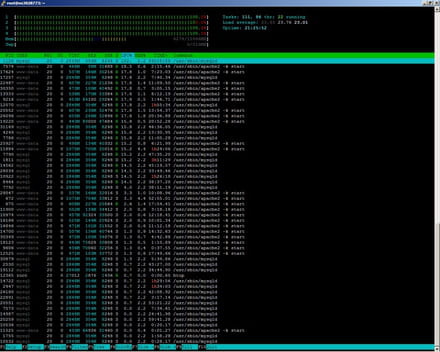Utilisation d etous le CPU du serveur par MySQL
Bonjour,
J'ai un petit soucis en ce moment. J'ai un serveur avec un CPU core i5 4 cores/4 threads avec 16 Go de RAM.
Je n'ai qu'un site web magento qui est là-dessus. Mais en ce moment, après avoir fait un htop en ssh sur le serveur j'étais étonné car les 4 cores du processeurs sont utilisés à 100% par MySQL.

Voici le paramètre que j'ai sur /etc/mysql/my.cnf
Dans l'attente d'une réponse positive de la par de tous.
Cordialement
J'ai un petit soucis en ce moment. J'ai un serveur avec un CPU core i5 4 cores/4 threads avec 16 Go de RAM.
Je n'ai qu'un site web magento qui est là-dessus. Mais en ce moment, après avoir fait un htop en ssh sur le serveur j'étais étonné car les 4 cores du processeurs sont utilisés à 100% par MySQL.

Voici le paramètre que j'ai sur /etc/mysql/my.cnf
The MySQL database server configuration file.
#
You can copy this to one of:
- "/etc/mysql/my.cnf" to set global options,
- "~/.my.cnf" to set user-specific options.
#
One can use all long options that the program supports.
Run program with --help to get a list of available options and with
--print-defaults to see which it would actually understand and use.
#
For explanations see
http://dev.mysql.com/doc/mysql/en/server-system-variables.html
This will be passed to all mysql clients
It has been reported that passwords should be enclosed with ticks/quotes
escpecially if they contain "#" chars...
Remember to edit /etc/mysql/debian.cnf when changing the socket location.
[client] port = 3306 socket = /var/run/mysqld/mysqld.sock
Here is entries for some specific programs
The following values assume you have at least 32M ram
This was formally known as [safe_mysqld]. Both versions are currently parsed.
[mysqld_safe] socket = /var/run/mysqld/mysqld.sock nice = 0
[mysqld] #
- Basic Settings# user = mysql pid-file = /var/run/mysqld/mysqld.pid socket = /var/run/mysqld/mysqld.sock port = 3306 basedir = /usr datadir = /var/lib/mysql tmpdir = /tmp lc-messages-dir = /usr/share/mysql skip-external-locking #Instead of skip-networking the default is now to listen only onlocalhost which is more compatible and is not less secure.bind-address = 127.0.0.1 #* Fine Tuning# key_buffer = 512M max_allowed_packet = 512M thread_stack = 192K thread_cache_size = 8This replaces the startup script and checks MyISAM tables if neededthe first time they are touchedmyisam-recover = BACKUPmax_connections = 500table_cache = 64thread_concurrency = 10#* Query Cache Configuration# query_cache_limit = 1M query_cache_size = 16M #* Logging and Replication#Both location gets rotated by the cronjob.Be aware that this log type is a performance killer.As of 5.1 you can enable the log at runtime!general_log_file = /var/log/mysql/mysql.loggeneral_log = 1#Error log - should be very few entries.# log_error = /var/log/mysql/error.log #Here you can see queries with especially long durationlog_slow_queries = /var/log/mysql/mysql-slow.loglong_query_time = 2log-queries-not-using-indexes#The following can be used as easy to replay backup logs or for replication.note: if you are setting up a replication slave, see README.Debian aboutother settings you may need to change.server-id = 1log_bin = /var/log/mysql/mysql-bin.logexpire_logs_days = 10 max_binlog_size = 100Mbinlog_do_db = include_database_namebinlog_ignore_db = include_database_name#* InnoDB#InnoDB is enabled by default with a 10MB datafile in /var/lib/mysql/.Read the manual for more InnoDB related options. There are many!#* Security Features#Read the manual, too, if you want chroot!chroot = /var/lib/mysql/#For generating SSL certificates I recommend the OpenSSL GUI "tinyca".#ssl-ca=/etc/mysql/cacert.pemssl-cert=/etc/mysql/server-cert.pemssl-key=/etc/mysql/server-key.pemsecure-file-priv = /var/tmp[mysqldump] quickquote-names max_allowed_packet = 16M[mysql]no-auto-rehash # faster start of mysql but no tab completition[isamchk] key_buffer = 16M#* IMPORTANT: Additional settings that can override those from this file!The files must end with '.cnf', otherwise they'll be ignored.# !includedir /etc/mysql/conf.d/
Dans l'attente d'une réponse positive de la par de tous.
Cordialement
A voir également:
- Utilisation d etous le CPU du serveur par MySQL
- Temperature cpu - Guide
- Utilisation chromecast - Guide
- Télécharger gratuitement notice d'utilisation - Guide
- Cpu burner - Télécharger - Optimisation
- Changer serveur dns - Guide
1 réponse

Bonjour,
Tu as regardé quelles queries étaient en cours et si tu avais des slow queries ?
https://dev.mysql.com/doc/refman/5.7/en/mysqldumpslow.html
https://stackoverflow.com/questions/568564/how-can-i-view-live-mysql-queries
Bonne chance
Tu as regardé quelles queries étaient en cours et si tu avais des slow queries ?
https://dev.mysql.com/doc/refman/5.7/en/mysqldumpslow.html
https://stackoverflow.com/questions/568564/how-can-i-view-live-mysql-queries
Bonne chance

